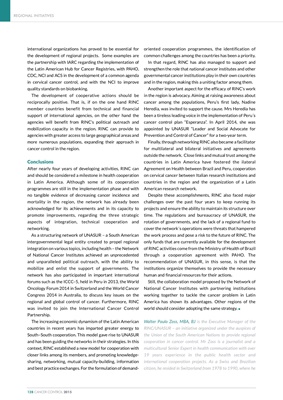
international organizations has proved to be essential for
the development of regional projects. Some examples are
the partnership with IARC regarding the implementation of
the Latin American Hub for Cancer Registries, with PAHO,
CDC, NCI and ACS in the development of a common agenda
in cervical cancer control, and with the NCI to improve
quality standards on biobanking.
The development of cooperative actions should be
reciprocally positive. That is, if on the one hand RINC
member countries benefit from technical and financial
support of international agencies, on the other hand the
agencies will benefit from RINC's political outreach and
mobilization capacity in the region. RINC can provide to
agencies with greater access to large geographical areas and
more numerous populations, expanding their approach in
cancer control in the region.
Conclusions
After nearly four years of developing activities, RINC can
and should be considered a milestone in health cooperation
in Latin America. Although some of its cooperation
programmes are still in the implementation phase and with
no tangible evidence of decreasing cancer incidence and
mortality in the region, the network has already been
acknowledged for its achievements and in its capacity to
promote improvements, regarding the three strategic
aspects of integration, technical cooperation and
networking.
As a structuring network of UNASUR - a South American
intergovernmental legal entity created to propel regional
integration on various topics, including health - the Network
of National Cancer Institutes achieved an unprecedented
and unparalleled political outreach, with the ability to
mobilize and enlist the support of governments. The
network has also participated in important international
forums such as the ICCC-5, held in Peru in 2013, the World
Oncology Forum 2014 in Switzerland and the World Cancer
Congress 2014 in Australia, to discuss key issues on the
regional and global control of cancer. Furthermore, RINC
was invited to join the International Cancer Control
Partnership.
The increasing economic dynamism of the Latin American
countries in recent years has imparted greater energy to
South-South cooperation. This model gave rise to UNASUR
and has been guiding the networks in their strategies. In this
context, RINC established a new model for cooperation with
closer links among its members, and promoting knowledgesharing,
networking, mutual capacity-building, information
and best practice exchanges. For the formulation of demandoriented
cooperation programmes, the identification of
common challenges among the countries has been a priority.
In that regard, RINC has also managed to support and
strengthen the role that national cancer institutes and other
governmental cancer institutions play in their own countries
and in the region, making this a uniting factor among them.
Another important aspect for the efficacy of RINC's work
in the region is advocacy. Aiming at raising awareness about
cancer among the populations, Peru's first lady, Nadine
Heredia, was invited to support the cause. Mrs Heredia has
been a tireless leading voice in the implementation of Peru´s
cancer control plan "Esperanza". In April 2014, she was
appointed by UNASUR "Leader and Social Advocate for
Prevention and Control of Cancer" for a two-year term.
Finally, through networking RINC also became a facilitator
for multilateral and bilateral initiatives and agreements
outside the network. Close links and mutual trust among the
countries in Latin America have fostered the ilateral
Agreement on Health between Brazil and Peru, cooperation
on cervical cancer between Italian research institutions and
countries in the region and the organization of a Latin
American research network.
Despite these accomplishments, RINC also faced major
challenges over the past four years to keep running its
projects and ensure the ability to maintain its structure over
time. The regulations and bureaucracy of UNASUR, the
rotation of governments, and the lack of a regional fund to
cover the network´s operations were threats that hampered
the work process and pose a risk to the future of RINC. The
only funds that are currently available for the development
of RINC activities come from the Ministry of Health of Brazil
through a cooperation agreement with PAHO. The
recommendation of UNASUR, in this sense, is that the
institutions organize themselves to provide the necessary
human and financial resources for their actions.
Still, the collaboration model proposed by the Network of
National Cancer Institutes with partnering institutions
working together to tackle the cancer problem in Latin
America has shown its advantages. Other regions of the
world should consider adopting the same strategy. l
Walter Paulo Zoss, MBA, BJ is the Executive Manager of the
RINC/UNASUR - an initiative organized under the auspices of
the Union of the South American Nations to provide regional
cooperation in cancer control. Mr Zoss is a journalist and a
multicultural Senior Expert in health communication with over
19 years experience in the public health sector and
international cooperation projects. As a Swiss and Brazilian
citizen, he resided in Switzerland from 1978 to 1990, where he
REGIONAL INITIATIVES
128 CANCER CONTROL 2015